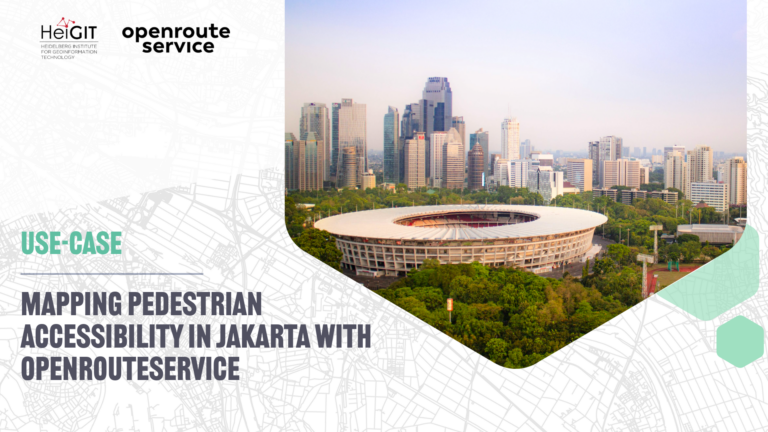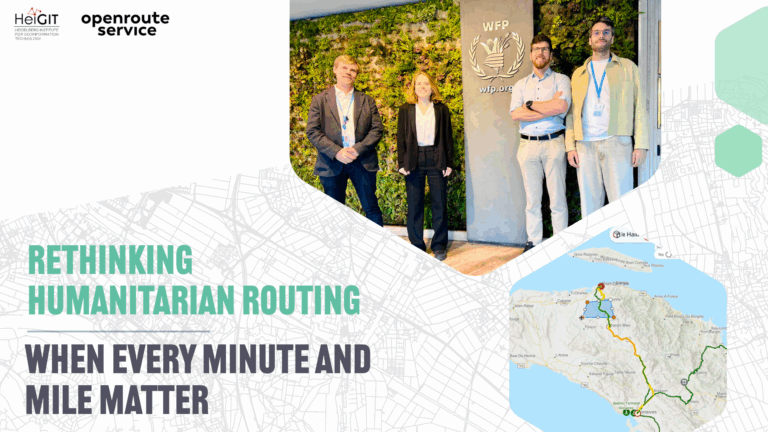Heat stress has emerged as an increasing concern for Germany. Since 1881, the number of days per year with a maximum temperature above 30°C has nearly tripled and a further increase of this trend driven by climate change is anticipated. Heat stress affects health and wellbeing in many ways, including dehydration, cardio-vascular stress and heat strokes. To evaluate whether a healthy-routing-app influences the behavior of users and thus their health by reducing heat exposure, HeiGIT joins forces with HIGH (Heidelberg Institute of Global Health) and TdLab Geography (Transdisciplinary Laboratory Geography) at Heidelberg University. We have secured funding from the BMBF (Federal Ministry of Education and Research) for the initial phase of the project GEHIPED (Gesundheitsförderndes Potential hitzevermeinedender Routenplanung auf individueller und stadtplanerischer Ebene; eng.: Health-promoting potential of heat-avoiding route planning at the individual and urban planning level).
The study
The main objective of our study is to evaluate whether a healthy-routing-app from another project, HEAL, has an influence on the behavior of users and thus on their health by reducing heat exposure. The project will analyze the effects of the app as an intervention on individual heat stress. The app suggests routes that are shady and have a lower heat stress score. The study will investigate the effect of the app on wellbeing for target groups, people with disabilities, migrants and the general population, focusing on vulnerable members of those groups, like the elderly or children.
In the first phase, a pilot study to test the intervention and the analysis of the effects of the app will be carried out. Experiences and results from the pilot study will be used as the base for the main analysis in a later project phase. Furthermore, we will use design thinking workshops to integrate both target groups and the city administration.
Employing a mixed-method approach, we evaluate the effects of the of the Healthy Routing App on individual heat exposure. The quantitative component comprises a randomized controlled study divided into two groups, with the study cohort in group 1 having access to the app and the intervention, and the study cohort in group 2 not having access to the app and the intervention. To measure individual differences on important health variables in the study population, fitness trackers will be used to record activity, sleep duration, the number of hours slept, and the heart rate of the study participants. Furthermore, we will ask study participants with a questionnaire about their perception of, e.g. the subjective stress sensation, especially regarding heat exposure, whether heat is perceived as a threat, what protective measures against heat are already used, but also about the acceptance of technological applications and the importance of user-friendliness.
The scientific background
In the Climate Impact and Risk Analysis 2021 (KWRA) for Germany, heat stress as a consequence of climate change was classified with a very urgent need for action. Because since 1881, the number of hot days in Germany with maximum temperatures of at least temperatures of at least 30 degrees Celsius has almost tripled. This makes heat one of the most underestimated and deadliest hazards. Every hot summer in people die from heat in Germany, according to the Federal Environmental Agency, in 2003, a total of over 20,000 people. Even slight deviations of about 1.5 °C of the core body temperature (37 °C (± 0.5 °C)) can significantly impair physiological functions and lead to a considerable reduction in physical and mental performance. Even a slight increase in ambient temperature or humidity has a direct effect on human health, causing, among others, dehydration, cardiovascular stress, physical and mental impairments, and heat strokes.
About HIGH
The Heidelberg Institute of Global Health (HIGH) is a research institute at the Faculty of Medicine at Heidelberg University. The institute is dedicated to advancing global health research, education, and interventions, addressing a wide range of health issues. Through its interdisciplinary and international approach, HIGH encourages collaboration and knowledge exchange, tackling complex global health challenges such as infectious diseases, chronic illnesses, health systems, environmental health, and the impacts of climate change on health. Through its work, HIGH aims to create and implement solutions that promote health equity and well-being across the globe.
About TdLab
The team of Heidelberg University’s TdLab Geography co-designs climate change mitigation and adaptation measures and brings this transdisciplinary and transformative approach to educational opportunities for university teaching and the public. Since its founding in fall 2018, TdLab Geography has already gained broad experience in the thematic field of transdisciplinary research on climate change and sustainability. It integrates natural and social science approaches and methods with equal cooperation with stakeholders from companies, authorities, politics as well as civil society.
About HeiGIT
The aim of the Heidelberg Institute for Geoinformation Technology (HeiGIT) is to improve the transfer of knowledge and technology from basic geoinformatics research into practice by using innovative geoinformation technologies. It was founded in 2019 as an affiliated institute of Heidelberg University and has since then been core-funded by the Klaus Tschira Stiftung. The institute researches and develops intelligent routing and navigation services for sustainable mobility and provides geodata for humanitarian missions. In addition, innovative services from the research areas spatial data mining and machine learning are used to analyze, process, enrich and visualize user-generated geodata (e.g. OpenStreetMap).




